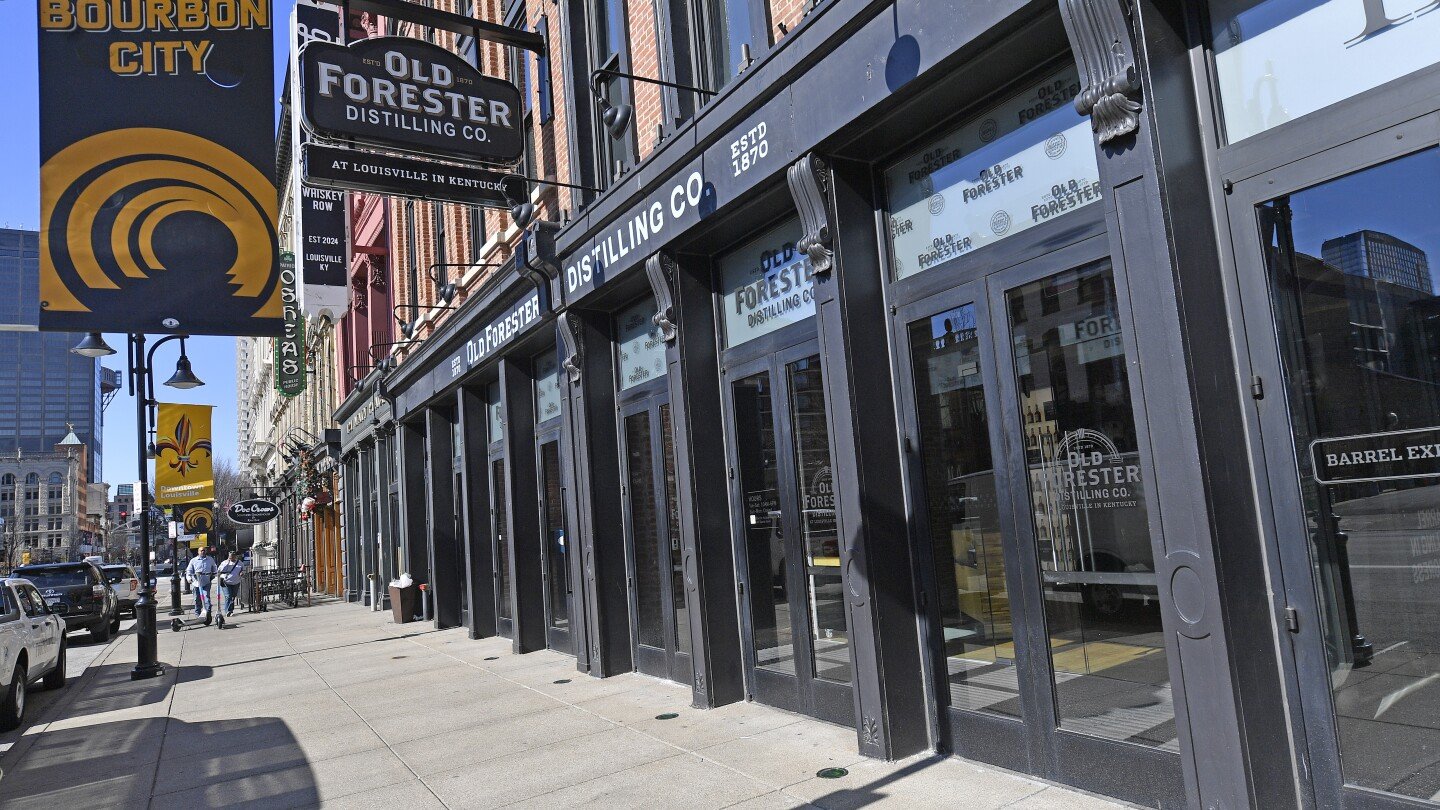
LAWRENCEBURG, Ky. (AP) — In the rolling hills of Kentucky where most of the world’s bourbon supply is crafted, the prospect of a new trade war feels like an aching hangover that won’t go away.
Kentucky bourbon producers again find themselves in the crosshairs as a target for retaliation after President Donald Trump ordered new tariffs on U.S. neighbors Canada and Mexico. On Monday, Trump and Mexican President Claudia Sheinbaum put their planned tariffs on hold for a month to give time for further negotiations.
American whiskey exports slumped badly amid an earlier trade dispute during Trump’s first term.
Canada, a key export market for American spirits, responded to this latest outbreak of trade warfare by initially ordering tariffs on American imports including beverages starting Tuesday. Some authorities in the provinces of Ontario, British Columbia, Quebec, Manitoba and Nova Scotia planned to remove American liquor brands from government store shelves.
The latest back-and-forth is a sobering prospect for Kentucky bourbon producers and their supporters. The bourbon industry pumps $9 billion into the Bluegrass State’s economy each year, creating more jobs and attracting more tourists than ever before, according to a study released last year. Kentucky distillers produce 95% of the global bourbon supply, according to the Kentucky Distillers’ Association.
Kentucky Democratic Gov. Andy Beshear warned that tariffs will hurt working families in a state that voted overwhelmingly last November to return Trump to the White House. The pain won’t be limited to distilleries, but will include every segment contributing to bourbon production, said Beshear, who is widely seen by political observers as a potential candidate for president in 2028.
“A state that voted for this president by more than 30 points is going to feel the impact of these actions. Think about the farmers that support the industry. The people in the bottling plants and the cooperages. These are our families, our neighbors,” Beshear said in a recent social media post, referring to cooperages where barrels are made.
Republican U.S. Rep. Andy Barr, whose district spans the heart of Kentucky bourbon production country, remained supportive of Trump amid the uncertainty hanging over the industry.
“Other nations have forgotten that the United States is the world’s superpower, and under President Trump’s leadership, they are quickly remembering that we will no longer be taken advantage of,” Barr said in a statement Monday.
Barr noted that discussions were continuing on the trade front and said he was committed to protecting the bourbon industry.
“Our distilleries are not just a proud part of our state’s heritage but also a vital engine of jobs and economic growth,” he said. “I will continue to advocate for our bourbon producers to ensure they are not unfairly impacted as we take necessary steps to safeguard America’s economic interests.”
The industry is hoping that cooler heads will prevail. Chris Swonger, president and CEO of the Distilled Spirits Council of the United States, urged the U.S. and Canada to reach an agreement that enables the spirits industries in both countries to thrive. Many producers are boxed in by the tariffs, he said.
“Some spirits are recognized as ‘distinctive products’ by the U.S. and Canada and can only be made in their designated countries, such as bourbon and Tennessee Whiskey in the U.S. and Canadian Whisky in Canada,” Swonger said in a statement. “As a result, the production of these products cannot simply be moved to another country or region.”
American whiskey producers faced headwinds even before the new trade dispute. It comes as the industry has massive inventories of aging whiskeys that will someday reach the market. In Kentucky, a record 14.3 million barrels of bourbon were aging, the Kentucky Distillers’ Association said recently. That inventory is awaiting bottling at a time when younger adults appear to be drinking less alcohol.
The biggest threat could be looming overseas, where the European Union is set to reinstate tariffs on American whiskey at a whopping 50% rate in late March if nothing is done to head it off. Trump told reporters Sunday that import taxes will “definitely happen” with the European Union and possibly with the United Kingdom as well. The return of tariffs in the biggest export market for American whiskey would be devastating, Swonger has said.


